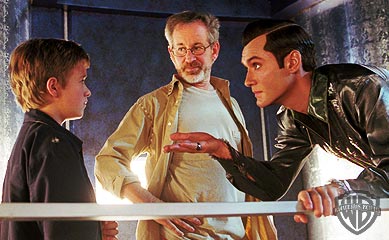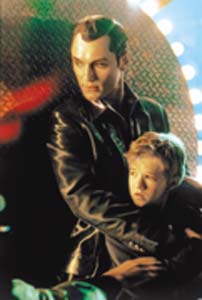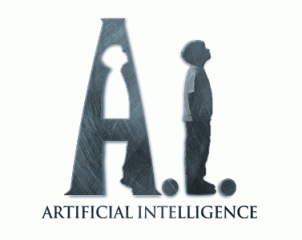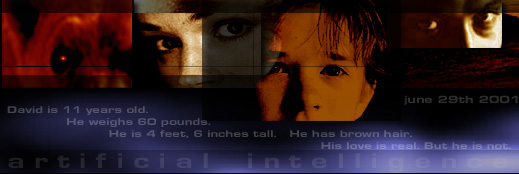|






A.I.: Artificial Intelligence (Review)
Kit Bowen
This film about a child robot's search for
love deals with subject matter that is
unique to famed director Steven
Spielberg--science fiction, children,
mind-blowing special effects--but the
dark and sometimes hopeless tone of A.I. may be a bit of a
departure for him.
Story
In the 21st century, life is not all
good on Earth. The polar ice
caps are melting, submerging many of the world's coastal
cities.
To help cope with the situation, artificial intelligences, or robots,
have been created, and are generally designed for specific
purposes--housework, babysitting
and even sex. A genius
professor (William Hurt) builds an 11-year-old child robot named
David (Haley Joel Osment) for a different purpose, a child android
that, once "imprinted" by his human parents, can actually feel
emotions. When
a couple (Frances O'Connor and Sam Robards),
despondent over the loss of their own son,
takes on the role of
David's "test" parents, they set in motion a personal
journey for
the young boy. Through a series of events, he is forced to seek
out his own humanity and attain the one thing he wants most in
the world--to be real
and to be truly loved.
Acting
OK,
if Spielberg had to sit down and find someone who could play
a child robot who just
wanted to be loved, his choice probably
wasn't that hard. Osment is just one of those
child actors who
breaks your heart the minute he comes on the screen. He did it in
The Sixth Sense and even in the melodramatic Pay It Forward. No
actor out there has the soulful face that he does. But his
performance in A.I. takes
the cake. Osment is almost eerily
perfect as David. Never once do you doubt he is artificial,
as he
watches with amazed curiosity, and sometimes horror, the world
around him. And never once so you forget that he wants
desperately to be real. There
are some nice supporting turns,
especially by Jude Law, playing the gigolo android who
helps
David in his quest, and by O'Connor as David's "mother." But it
was without question Osment's film.
Direction
Spielberg took over the project, based on the short story
Super-Toys Last All Summer
Long by science fiction author Brian
Aldiss, from the late Stanley Kubrick, who had
been trying to get
the film made for 20 years. And therein lies the film's main flaw:
it's not really a Spielberg special. It did have a lot of elements he
has made his own (he even expands on his Close Encounters
alien), but this film was
very dark, somewhat hopeless and pretty
slow. That's definitely not Spielberg's usual
direction for a movie,
especially one based on original material. Kubrick excelled at
bringing to life those slow, methodical story lines and didn't care if
an audience liked it or not, but Spielberg is used to creating
wide-eyed extravaganzas
and historical epics that capture their
audiences' hearts. Yes, Spielberg's war movies
are somber, but
that's because they are real--those events really happened. A.I. is
a different kind of Spielberg film, and some audiences may not be
ready for it.
from hollywood.com
Would you like to get science fiction perspective on Artificial
Intelligence? On the 28th of September, Steven Spielberg's new
movie "A.I", will be playing at cinemas across
Sweden.
The only thing you need to do to get two free tickets to the movie is
to tip us about a colleague
of yours who is in need of TiFiC.
Click here to tip us!
We are sorry to say that tickets only are
valid in Sweden.
About the Movie "A.I."
Sometime in the future of the 21st century, in
a time when the
Greenhouse Effect has melted the icecaps, submerging many of the
coastal cities in water, mankind
depends upon computers with
Artificial Intelligence to maintain our way of life. Man has also found
new friends
in A.I., in the form of robots that are used for a variety
of functions. This story is about a boy robot (Haley Joel
Osment), and
the emotional journey he makes toward becoming... something
more.
Casting: Jude Law
& Haley Joel Osment
Directed by Steven Spielberg
Movie Profile
The Setup
Based on an unfinished project by
Stanley Kubrick, "A.I." imagines a
robot Pinocchio--David (Haley Joel
Osment)--who is abandoned by his
human mother and forced to make his
way
through a terrifying future world.
Jude Law is Gigolo Joe, a surrogate
sex machine who reluctantly befriends
the boy and guides him through some
hellish imagery that draws equally on
"Schindler's List" and "A Clockwork
Orange."
The Breakdown
The conjunction of two legendary
control freaks, Spielberg and Kubrick,
results in a wildly undisciplined feature
that seems to operate on pure id. All
the childhood trauma that Spielberg
carefully ironed out of his idyllic
suburban fantasies returns with a
vengeance: There are moments that
evoke the most anxiety-ridden Disney
classics ("Bambi" and the 1940
"Pinocchio") but Spielberg doesn't
offer Disney's consoling tenderness.
"A.I." is too personal and too reckless,
but that's a welcome change in a time
of bland and anonymous studio films.
Dave Kehr
Space Oddity
Spielberg and Kubrick had a weird little kid, and its name is A.I.
BY ROBERT WILONSKY
For almost two decades, Stanley Kubrick
wanted to
make a film based on Brian
Aldiss' 1969 short story "Super-Toys Last
All Summer Long," about a robot child
named David who wants only to be "real"
so Mummy and Daddy will love him. The
late director of 2001: A Space Odyssey
and A Clockwork Orange envisioned
"Super-Toys" as the frame upon which he
could hang his own reworking of
Pinocchio, and perhaps he also saw it as
an
extension of what he began in 2001:
David is HAL as a little boy, a machine
who aspires to consciousness and emotion
-- in other words, a machine that wants to
become like its creator. But Kubrick
found an even better director for his
project: friend Steven Spielberg, whom
"Super-Toys" would allow the chance to
revisit old themes and doll them up in the
fancy togs of a fellow mythmaker. He
could remake Close Encounters of the
Third Kind and E.T. in Kubrick's image.
He could commingle the childlike with the
clinical, the heartbreaking with the
heartless. Finally, Spielberg could make a
movie about children and aim it solely at
adults. (The movie is simply too slow, too
serious, even too sex-drenched to play to
kids.)
The results, then, are just as you would
expect: A.I. Artificial
Intelligence is
Kubrick as interpreted by Spielberg, which
means it's by turns
poignant and cold,
twisted and sweet, dreamy and drab,
effortless and overwrought.
In short, the
movie is a stunning, ambitious mess that
leaves you wondering
how much better it
might have been without Kubrick's
specter peering over
Spielberg's heavy
shoulders. But what else could it have
been? Theirs is hardly
a perfect marriage:
Kubrick's movies are chilly, existential
tone poems made
by a control freak who
loved movies but not necessarily the
people who paid
to watch them. His
perfectionism too often quashed whatever
passion sneaked
into his films -- they look
great but feel empty. Spielberg, especially
the
young man who made Close
Encounters and E.T. the
Extra-Terrestrial, revels
in innocence and
awe. Spielberg, the eternal optimist,
presents life as one
big happy ending:
We're going to be rescued, whether by
aliens or Roy Scheider
or Tom Hanks.
Kubrick, the curmudgeonly cynic, seemed
to believe we are all
doomed. One walks
out of his movies filled with hope only
because we hope
the world isn't as bad
off as he suggested.
A.I. attempts to reconcile
those disparate worldviews. The movie wants to
overwhelm you with sadness and despair, but it's too
frosty and
manipulative to elicit a single tear. Spielberg is credited with A.I.'s
screenplay -- it's the first time he's written and directed since Close
Encounters -- but the film
is faithful to both Aldiss' story and Ian Watson's
original screenplay, commissioned by Kubrick. Watching
it, you can't help
feeling that the director wanted to become Kubrick, which means this is
the first Spielberg movie that seems to have one hand on your chest,
keeping you at bay.
A.I. fleshes out, for lack of a better phrase, Aldiss' simple, heartbreaking
short story into a grand-scale
fairy tale -- Pinocchio as reimagined by the
visual-effects team at Industrial Light & Magic.
We learn at the film's
onset that the ice caps have melted and drowned Earth's biggest cities, and
in a distant, overpopulated future in which childbirth is regulated by the
proper authorities, humanoid robots have taken over our most menial
chores; they serve us, even pleasure
us, until they're discarded for better
models. Professor Hobby (William Hurt), A.I.'s Geppetto, proposes
to a
group of fellow robotic designers that they create a "robot who can love,"
and the result is little David (Haley Joel Osment), who is made of synthetic
flesh and computer circuitry.
Hobby is unprepared to answer the inevitable
Big Question: Can you get a human to love the robot back?
The response is found in the home of Monica and Henry Swinton (Frances
O'Connor and Sam Robards), whose flesh-and-blood son Martin (Jake
Thomas) suffers an illness that
requires that he be suspended in cryogenic
deep-freeze. His holding tank is in but one of myriad scenes
that look like
something lifted from 2001; the audience, like Martin, shivers in the sterile
setting. Henry, who works for Professor Hobby, envisions David as
Martin's replacement, but Monica
refuses to look at his unblinking,
expressionless face -- a machine bereft of true emotion but prone
to
disturbing outbursts of laughter. Monica finally warms to the cold little boy,
imprinting him with seven words that will forever bond mother and "child,"
and as she does
so, his face softens (Osment looks, on occasion, like Cary
Guffey, the child in Close Encounters who
longs to ride in the crystal
chandelier in the sky). The catch is that David can love only her, and
if
Monica ever decides she no longer wants David, he will have to be
destroyed.
But Monica and Henry will never love David as they do Martin, who one
day comes home from the hospital and begins treating his "brother" as if
he's nothing more
than the latest and greatest super-toy -- a better version
of their talking teddy bear. Martin taunts
David, constantly reminding him
of his artificiality; he's a "mecha" (a machine) in a world
of "orgas"
(organics). Martin gets Monica to read to them from Pinocchio: "David's
going to love it," Martin says with a cruel smirk. But the story gives David
hope: If he can find the Blue Fairy, he, like the puppet in the book, can
become a real boy.
The first third of A.I. feels so much like Kubrick it's as though the film had
been directed by a ghost. The Swintons' home, with its polished wood
floors and post-IKEA furnishings,
looks barely lived in. It's a quiet, lonely
place, and even composer John Williams, who's made millions
providing
Spielberg with orchestral bombast, stays hidden in the shadows with music
that's less a score than a whisper of strings. Up to this point, the movie
plays like small-scale
domestic drama -- the story of a rejected stepchild
wanting to love and be loved. But all that gives
way when Monica takes
David out in the forest to dump him, lest the rejected boy end up destroyed.
His screams pierce the soundtrack ("If I become a real boy, can I come
home?") as the landscape becomes suddenly desolate and threatening.
What follows next
is perhaps the most twisted Kubrick-Spielberg amalgam
imaginable: We're introduced to Gigolo Joe,
played by Jude Law behind a
thin veneer of makeup that turns him into a human-size sex doll -- Fred
Astaire on the dance floor, porn star John Holmes in the sack. Living in a
sleazed-out town, Joe comes across as something that could have been
cooked up by Kubrick's Dr. Strangelove
collaborator Terry Southern, a
man fond of his kink. "Once you have a lover robot," Joe
brags, "you'll
never go back." But Joe is nothing more than a plot device, the older
brother David never had. He belongs in a different movie -- a fun one.
When Joe finds himself
in bed with a dead girl, he's forced to go on the run
and winds up in a robot graveyard in which outdated,
gruesomely
half-destroyed models scavenge for parts. David and Joe are rounded up
for a Flesh Fair, where mechas are destroyed onstage for human
amusement. It's a horrific moment,
because it subverts an image from E.T.:
The moon literally rises out of the horizon and scoops up
the unsuspecting
androids, hauling them off to slaughter. It's BattleBots gone mad, a Klan
rally in which humans destroy their mechanical -- indeed, their superior --
counterparts.
Like 2001, A.I. suggests that artificial "humans" are better than the real
thing; if theirs is a synthetic love, at least their processors don't
manufacture synthetic hatred.
The humans are ogres, be they Monica
Swinton (who else but a hateful woman would dump a child in the
middle
of nowhere?) or Lord Johnson-Johnson (Brendan Gleeson), the
robot-hunter
who terrifies the Flesh Fair audience by insisting David is part
of a "plan to phase out God's
little children." But whatever point Spielberg
is trying to make about racism and fear of the
future is lost in the spectacle
and eventual sentimentality of the Flesh Fair sequence, which deteriorates
into proselytizing by way of the World Wrestling Federation. And because
we
see the struggle to define humanity through the eyes of David and Joe
and not their creators, the
battle between mechas and orgas becomes
simply too cartoonish to take seriously.
Joe finally leads David to a place where he might find the man who knows
the Blue Fairy: Rouge Town,
a dreamy Fuck City where denizens populate
A Clockwork Orange's milk bar, clubs are entered through
the parted
thighs of computer-generated women and Dr. Know provides answers to
scared little synthetic boys. And here, suddenly, the movie begins to fall
apart: Robin Williams,
as the voice of the Einstein look-alike Dr. Know,
conjures memories of his own Bicentennial Man, a
clumsy, sickly sweet
version of what's essentially the very same tale.
In the end, the film fails because Spielberg chickens out. Instead of a
Kubrick movie, he's remade
Close Encounters, only without the sense to
edit himself (even the music echoes Williams' use of "When
You Wish
Upon a Star"). A.I. comes to a very logical, if overpoweringly cheerless,
ending about 15 minutes before the final credits roll. But Spielberg plunges
forward, and the result
is frustrating and pointless. What had been a fairy
tale becomes daffy sci-fi tomfoolery; our emotions
are hung out to dry
along with some garish special effects that serve only to create distance
between David and the audience -- distance that didn't exist until that point.
It's as though
Spielberg has succumbed to the "ponderous seriousness" of
which Pauline Kael wrote in The
New Yorker when comparing Close
Encounters (which she loved) to 2001 (which she loathed). The
mythmaker who wants to explore just what makes us human (our desires
and drives, as it turns out,
not merely our emotions) succumbs to the
franchise-maker who wants to usher us out the door feeling
if not cheerful,
then at least satisfied. The ending -- which suggests that little boys want
nothing more than to sleep with their mothers -- is not enough to betray the
movie,
which is too engaging, too ambitious and too bizarre to dismiss, but it
suggests that Spielberg is
not quite ready to make grown-up sci-fi movies.
And he won't be until he figures out that happy endings
aren't always the
best endings.
More Reviews
tific Digital
newstimesla
movie search
|
